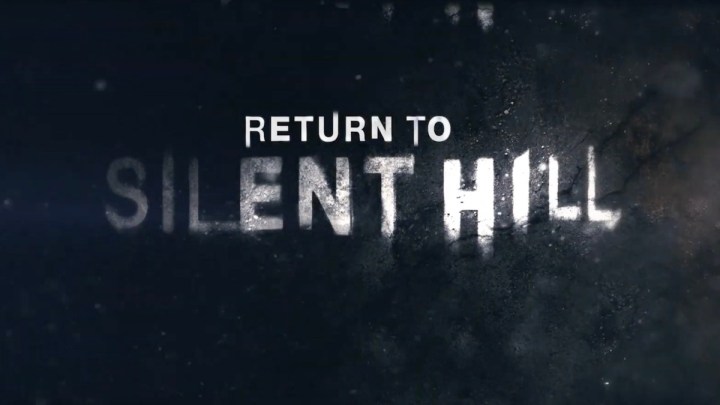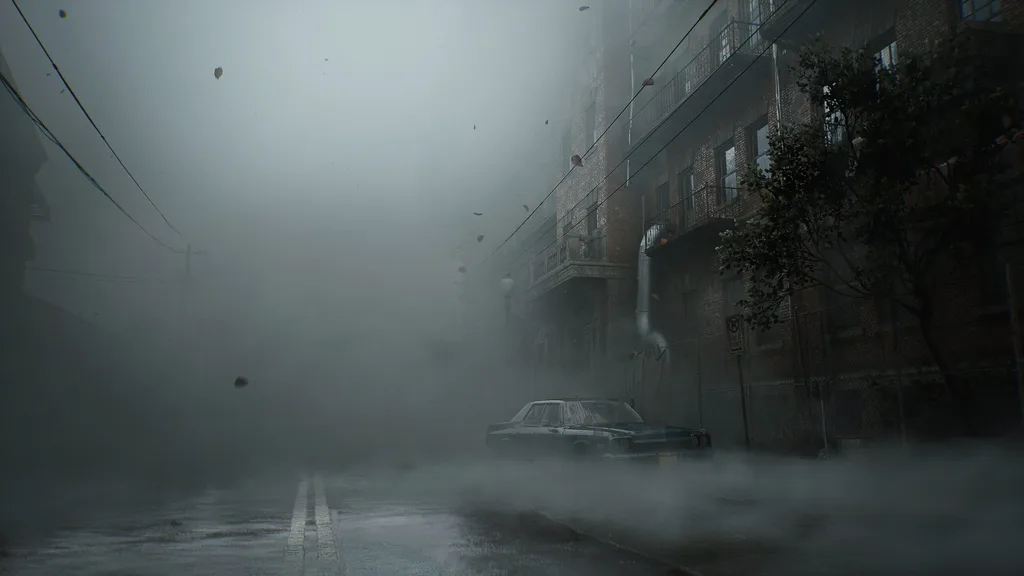The Silent Hill series is coming back, and we’re not just getting one new game … we’re getting four. And a new movie! And more merch!
It’s certainly more than what a lot of people would have expected when Konami announced we were getting a presentation on the series’ future last week (I’m a big series fan, and my expectations were very low). Most people were expecting a new game and a Silent Hill 2 remake based on leaks and rumors, but the series had been all but dormant since Silent Hill: Downpour in 2012, so there was no reason to expect anything more. In the past decade, Konami has used the IP on pachinko machines, skateboards, and little else.
However, the publisher managed to surprise almost everybody. Regardless of what you thought of the announcements themselves, it shows that Konami has a vested interest in keeping the franchise alive and bringing it into the 2020s. Not only is it modernizing the series with remakes and new titles, but it’s also modernizing how it leverages the IP into a new kind of franchise.
Franchising isn’t anything new with video games. Big series like Pokémon, Assassin’s Creed, and Call of Duty have been doing it for over a decade. However, this was often done via internal teams or familiar collaborations. Konami is now one of a few giant video game corporations chasing a new strategy. Why churn out one game a year when you can use third-party studios to create aggressive multimedia juggernauts?
Why is Konami doing this?
Konami’s strategy is simply following trends. The video game economy has changed significantly over the past decade. There are a lot of things you can point to — the rise of the indie, the fall of the used game market, tacking multiplayer modes onto everything — but arguably the largest is the rise of the live-service game. AAA titles are taking longer to make and get more expensive every year, so studios have been looking for ways to continue making profits in between large releases. Many have tried tactics like loot boxes, microtransactions, and those aforementioned multiplayer modes. Unfortunately, they were low-quality at best and exploitative at worst.
Companies want to get in on live-service games because they can potentially make money consistently. Of course, they must be worth playing, and developers have to continue updates, but they can be profitable for studios. It’s why Sony is investing heavily in live service with its acquisition of Destiny 2 studio Bungie.
However, not every franchise can be turned into a service, so studios are trying the next best thing: releasing multiple games and other media based on a singular IP in close succession. This allows a studio to make more money off of one series.

You can see this happening across the industry. Assassin’s Creed developer Ubisoft, which had followed the typical franchise model in the past, plans to use multiple teams across the company to create different types of experiences for players, from two traditional RPGs to the Infinity hub and a mobile game. Similarly, Konami is helping to produce two flagship Silent Hill games — Silent Hill: F and Silent Hill: Townfall — along with a live interactive experience called Silent Hill: Ascension and the Silent Hill 2 remake for PlayStation 5.
Ubisoft has given insight into why this will work. Series executive producer Marc-Alexis Côté said in its announcement press release that the studio can use teams to pursue “different creative tracks within the franchise” so they don’t cannibalize each other.
“I think there are very valuable benefits to building games that are very different from one another in our two studios, because it helps us collaborate, as we’re not both building RPGs on top of one another,” he said. It’s framed as a benefit from studio and consumer standpoints, which is likely true since it allows for longer development cycles to give Ubisoft the room to dig into the Assassin’s Creed franchise for content.
Sony is also trying this with The Last of Us. It just released a remake of the first game and is currently working on a standalone multiplayer title, which was originally supposed to be a side-component in The Last of Us Part II and has since been spun off into its own title.
Studios are not only announcing multiple titles using one IP, but are also showing them off much earlier. CD Projekt Red announced in October that it’s working on a new The Witcher trilogy, along with a sequel to Cyberpunk 2077. These four Silent Hill titles are certainly not all coming out next year, yet Konami is using their existence to build up excitement in a similar way.
But wait, there’s more
There’s another key component of this strategy. Why just create games? After years of Hollywood struggling with video game adaptations, studios are, in a way, taking matters into their own hands. Sony, Ubisoft, CD Projekt Red, Riot Games, and others are producing movie and TV adaptations that tie into their most famous franchises, including The Last of Us, God of War, Assassin’s Creed, and so many others. This is not only another way to use IP, but it’s also proven to funnel users back to the games, even when they’re a few years, or even decades, old.

If people watch an anime on Netflix called Cyberpunk: Edgerunners, and then find out that it’s based on a video game, they will likely want to check out the video game. This undoubtedly contributed to the increased success of Cyberpunk 2077, along with a string of updates. Similarly, following The Witcher’s debut on Netflix in 2019, NPD Group reported that sales of The Witcher 3: Wild Hunt, which came out in 2015, had exploded — physical sales were up 554% from the same time the year before. Over on Steam, it set a new franchise record of over 103,000 concurrent players.
For a long time, the first Silent Hill was one of the few “good” video game movie adaptations (the second one … not so much). Rui Naito, who’s in charge of IP and cross-media development for the franchise at Konami, emphasized the first film’s success during the presentation when he announced that its director, Christophe Gans, was returning to adapt Silent Hill 2 into a feature film. Naito also mentioned that the film pitch was one of the reasons why the company rebooted the franchise. While it’ll most likely come out after the Silent Hill 2 remake’s release, there’s no doubt the movie will funnel more users back to the games if its a success.
In my restless dreams, I see multiple studios
But how can one company do all of this in just a couple of years? Konami is working with studios filled with developers who say they are big fans of the original games. Every studio representative noted how important the series was to their previous games. Bloober Team, for example, has always worn its Silent Hill influences on its sleeve with games like Layers of Fear and The Medium, especially in regard to Silent Hill 2. The announcement that it was behind the remake wouldn’t have been a surprise even if it wasn’t already heavily rumored heading into the showcase.

“For many Bloober Team members, Silent Hill is the title which made them fall in love with horror games,” Piotr Babieno, CEO of Bloober Team, said during the presentation. “This is why we approach our work with a great respect to the original game.”
Not every studio can be like Ubisoft or Sony and have numerous smaller studios under its umbrella to spread out work, or like Nintendo, which works with a close-knit group of outside companies, so Konami outsourced it. This is common in game production, even beyond making multiple titles under one IP. As games get bigger, more support studios are brought in to help. Konami took it a step further by outsourcing the bulk of the design to smaller third parties, setting a precedent that we’re sure will be copied.
It’s unclear whether or not Konami just doesn’t have the internal development resources for future Silent Hill games or wanted to give independent studios with experience in horror a chance. Regardless, it takes a lot of strain off Konami while still allowing it to tout that it’s revitalizing a classic series.
Konami is ahead of the game
Konami is just one of many studios trying out a different approach to franchising its video games more aggressively. Instead of stuffing titles with exploitative microtransactions or introducing live-service mechanics, it’s just going to release a ton of games from one series. It’ll ensure that Silent Hill will always be top of mind because there will always be a game or movie on the way.
Other studios are doing this as well, but they need the resources to develop multiple games at once. Konami is bucking the trend slightly by relying on third-party studios for primary development, versus others like Ubisoft that are either keeping it in the family and only outsourcing some extra work to support teams.
We’ll have to wait to see if this strategy pays off in the long run. Konami still has to produce quality titles for players. Plus, we don’t know yet what ties all of these seemingly different games together because it doesn’t seem to be the town of Silent Hill in every case. However, it’s already been successful in one way. At least we’re talking about Silent Hill again, which is already a step in the right direction for Konami.
Editors' Recommendations
- Dragon’s Dogma 2 changed how I look at fast travel in video games
- Silent Hill: The Lost Message struggles to modernize a sensitive series
- Metal Gear Solid 3 and Silent Hill 2 remakes confirmed to launch in 2024
- Silent Hill Ascension: Release date, trailers, gameplay, and more
- I used to be too scared to play horror games. Then I saw the light



